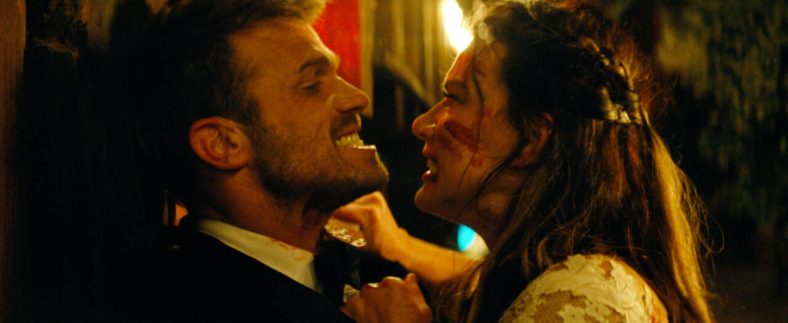Matrimony and Murder in ‘Til Death Do Us Part’ [Review]

Til Death Do Us Part is dead on arrival. There is nothing to part because there isn’t an element left alive to work with. Director Timothy Woodward Jr., writers Chad Law and Shane Dax Taylor, and star Natalie Burn all bring something distinct to Til Death Do Us Part’s very-of-the-moment slasher extravaganza, and credit must be given where it’s due. Somewhere along the way, however, like errant wedding plans gone off track, Til Death Do Us Part got lost. What’s left is a mishmash of other, better movies packaged within an interminable two-hour runtime of shoddy exposition, dreadful intrigue, and mechanical audio-visual design. For this wedding, I’ll RSVP no.
Akin to its contemporary brethren, Til Death Do Us Part starts in media’s res. Burn’s bride, never given a name, is preparing for a non-descript wedding in a montage of glossy, oversaturated visuals scored with what sounds like “Gardenscapes” music. Incredulously, Til Death Do Us Part then cuts to another timeline, this time with the bride and groom (Ser’Darius Blain, given nothing to do) on their ostensible honeymoon. Another disorienting time jump later and Til Death Do Us Part finally arrives at the hook. Through the temporal uncertainty, the bride has fled her own wedding, holing up at a family home while the groom’s party is en route. They intend to keep her there until the groom can come and talk some sense into her.
From here, it’s clear that the wedding wasn’t exactly above board. There’s talk of a cryptic school, whispers that she knows too much to simply bail, and an overall suggestion that she’s lucky to have even had the wedding approved in the first place. A love bird with cold feet, this is not.
The pursuing groomsmen are an anemic bunch, with only Cam Gigandet’s best man endeavoring to accomplish anything remotely resembling a personality. That said personality amounts to feigned jubilation to juxtapose against violent intention is a shame. Audiences have seen the manic villain before, and Gigandet often resigns himself to sluggish beats of dancing to “Rockin’ Robin” despite the bloodshed surrounding him. The villain banter isn’t much better, and almost every joke falls flat on account of fragmented editing that often results in a prolonged gap between a joke’s delivery and response.
Repeatedly, Til Death Do Us Part cuts back to the movie’s vegetarian option in Puerto Rico. The movie forgoes confirming whether this honeymoon is past or future, though the exploits there—and its inevitable endgame—are outlined from the start, forcing audiences to trod through predictable reveals and turns of fate. The siege of the house itself is the better entree, though only marginally.
Natalie Burn’s background in ballet and stage combat boons whenever the action gets physical. While her performance is passable elsewhere, she’s a beast with a knife, a chainsaw, or anything else she can get her hands on. The action is mostly bloodless, obscured by poor lighting and too-frequent cuts away from the aftermath, though the choreography is Til Death Do Us Part’s sole bright spot. Every performer, including Pancho Moler and D.Y. Sao, are game for the more involved hand-to-hand scuffles. Yet, despite a marketing campaign that promises heaps of bloodshed, those fights arrive just as quickly as they end.
Ambiguity further bogs action sequences down, with reveals held back for too long—why, for instance, does everyone want this bride dead—that disappoints when finally delivered. The thrust of Til Death Do Us Part’s answers come in a painful exposition dump wherein Cam Gigandet seems to have been given a different script. Mid-combat, he stops to reveal it all to a character who, by the movie’s own logic, already knows what’s going on. It’s egregiously out of sync, indicative of Til Death Do Us Part’s inability to commit to any consistent thread or tonal balance.
Pitched as John Wick meets You’re Next, Til Death Do Us Part is the worst of both worlds. The premise yields promise, and there’s no doubt everyone involved gave it their all. However, lackluster performances, a dull script, and a laborious runtime run counter to genre expectations. Where grindhouse kills, and some combative spice would have elevated Til Death Do Us Part’s more ridiculous moments, it too regularly plays it straight. Aiming for somberness but instead achieving somnambulism, Til Death Do Us Part is a tension-free slog.
-
Til Death Do Us Part
Summary
For this wedding, I’ll RSVP no.

